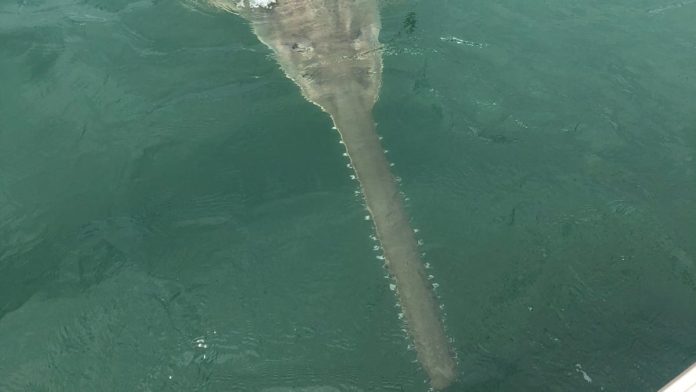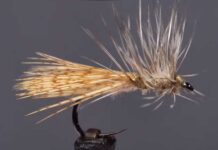UK angler catches sawfish April 9, 2022 off Cocoa Beach
A 13-foot long sawfish was caught & released April 9, 2022 by a UK angler fishing with Fin & Fly charters in Cocoa Beach.
CONTRIBUTED PHOTO BY FIN & FLY CHARTERS, Florida Today
When Ian Atherton traveled across the pond from his home in Fleetwood, England to Florida’s Space Coast for an April vacation, one of the things he had on his bucket list was to catch a shark. He had always envisioned what it would be like to tangle man-to-fish with one of the ocean’s most fearsome apex predators.
How’s that saying go about best laid plans?
Atherton was able to catch and release a giant seagoing fish, only it wasn’t a shark, but a distant cousin and something much rarer — and some might say cooler — than a shark.
Mysterious catch: What kind of sea monster was caught near the Kennedy Space Center?
Mystery meat: Endangered shark meat in some pet food? One study says yes, calls for clearer labeling
Ground zero: Brevard County remains epicenter of manatee die-off
What in the world?
Atherton joined Capt. Jon Cangianella of Fin & Fly charters in Cocoa Beach April 9 for a morning half-day to begin with shark fishing, then to try to catch some of the other popular fishing targets in the nearshore waters of the Atlantic Ocean.
Cangianella steered Atherton out from Port Canaveral to a spot in about 35 feet of water a few miles from the inlet. He deployed a chunk of bluefish, an oily fish which draws in sharks from a large distance once the scent of the fish gets into the ocean’s currents.
Soon, there was a bite. Right away, line began peeling off the reel — not fast, but steady and strong. Atherton reeled tight to set the hook and began his battle on rod and reel. The tug of war went on for about an hour. As the fish drew close to the boat, Cangianella knew what Atherton had might not be a shark after all.
The rostrum, or saw, came out of the water. It resembles a hedge trimmer and on a large sawfish it can measure up to 4 or 5 feet in length. The fish uses it in the wild by swinging it back and forth through a school of small baitfish. A whack from the saw will stun a small fish allowing the sawfish to pick it up from the bottom since it mouth is located on the underside of the large fish. They also eat crustaceans and other bottom dwelling organisms.
The sawfish is actually very closely related to stingrays, not so much sharks, but is sometimes caught using the same methods. They inhabit Florida waters, but their population numbers in the wild are a mere fraction of what their numbers were before pioneer families 120 years ago began fishing coastal waters with nets.
Let it go
Cangianella freed the sawfish from its hook without removing it from the water, and the sawfish swam off healthy and strong. After the unique encounter, they set out for another spot with different bait where Atherton landed a few king mackerel.
Unfortunately, his dream of catching a shark wasn’t completed. However, he could have never imagined he would catch something so rare and mysterious as a sawfish.
Another skipper with Fin & Fly charters, Capt. Parker Miley steered a Wisconsin family to a sawfish catch in the same area in August 2021. Another angler in 2021 encountered a healthy sawfish in the Indian River Lagoon in Brevard County.
Call it a come back
Smalltooth sawfish can grow to about 16 feet long. They are one of five sawfish species worldwide and the only sawfish species found in Florida waters. Historically, the species was found along the U.S. East Coast and throughout the Gulf of Mexico, including the waters of the Indian River Lagoon, Charlotte Harbor and the Everglades.
But sawfish become easily entangled in fishing nets used by commercial fishers seeking other targeted species. Since the early 1900s, sawfish populations have declined dramatically. Sadly, they became the first marine fish species listed as endangered in 2003 under the U.S. Endangered Species Act.
For more information about ongoing sawfish research and recovery efforts in Florida, visit FWC Sawfish and the Sawfish Recovery webpage at sawfishrecovery.org.
To report sawfish sightings, call the Sawfish Hotline: 1-844-4SAWFISH, fill out an online report form at floridamuseum.ufl.edu/sawfish/report-encounter or email sawfish@myfwc.com.
What to do if you catch a sawfish
- All sawfish caught in U.S. waters must be released unharmed immediately, or face federal charges.
- Keep sawfish in the water at all times.
- If it can be done safely, untangle the line if it is wrapped around the saw and remove as much of the line as possible.
- Cut the line as close to the hook as possible.
- Do not handle the animal or attempt to remove any hooks on the saw unless you have a long-handled de-hooker.
- Do not remove the rostrum, or saw.
Florida sawfish encounters 1782-2017
- Total: 11,523
- Monroe: 5,939
- Lee: 2,726
- Charlotte: 1,020
- Collier: 974
- Martin: 177
- Palm Beach: 135
- Broward: 122
- St. Lucie: 71
- Miami-Dade: 53
- Pinellas: 41
- Brevard: 40
- Sarasota: 32
- Manatee: 27
- Indian River: 26
- Hillsborough: 25
- Volusia: 16
Source: International Sawfish Encounter Database
Ed Killer is florida today’s outdoors writer. Friend Ed on Facebook at Ed Killer, follow him on Twitter @tcpalmekiller or email him at ed.killer@tcpalm.com.
Credit: Source link






























